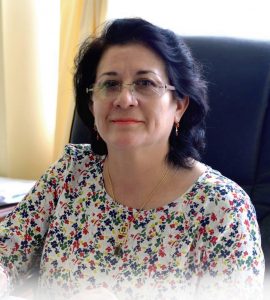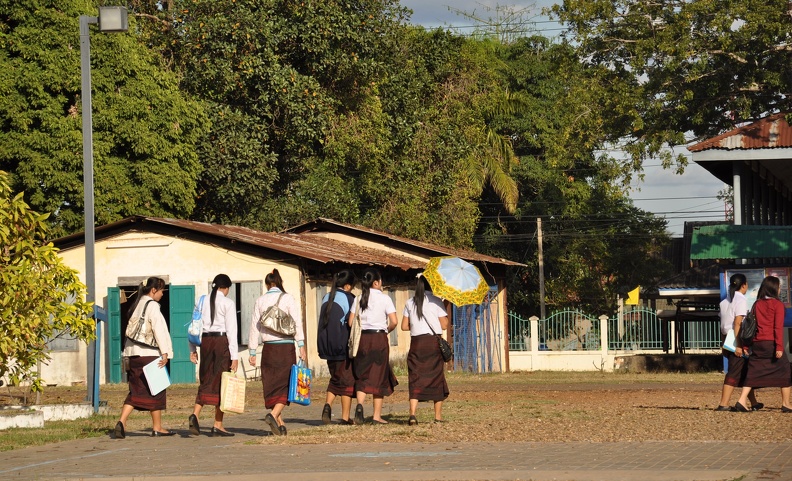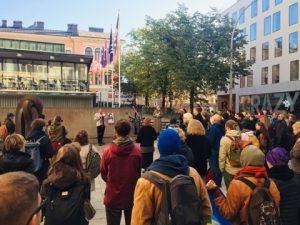By Paola Minoia, Lecturer in Development Studies
(The original version of this piece can be found on the ECO-CULTURAL PLURALISM IN ECUADORIAN AMAZONIA blog for the “Goal 4+: Including Eco-cultural Pluralism in Quality Education in Ecuadorian Amazonia” project.)
Conversation with Dra. Ruth Arias, Rector of the Universidad Estatal Amazonica.

Paola: How is the situation, Ruth?
Ruth: We have been in quarantine since March 17, when the public emergency was declared. I could sense panic in the population from people’s behaviour, as socioeconomic differences are deepened and plenty of defiances is evident; there also are signs of solidarity and reflection. I think Boaventura de Sousa Santos’s writing, “The vulnerable and discriminated against in the South”, and Silvia Ribeiro from the ETC group, have very good analyzes of the situation many are experiencing.
The issue has overwhelmed us as a country. I cannot imagine why our infection figures are higher than Colombia and Peru, which have a much larger population. It may be that not all the figures are published in all countries. Ecuador is also smaller, has a higher population density, and the origin and fast dispersion were not anticipated.
In many of our provinces, we do not have the necessary health facilities. At Pastaza, at first, we were told the only ventilator was taken to Guayaquil; similarly, rural doctors came from various communities to help in hospitals in Guayaquil. Nevertheless, this week they announced that there are almost a dozen ventilators for the province. However, the Amazonian provinces have experienced less contagion. There are many places where blockages have been instated to prevent strangers from entering the towns, although this also limits the mobility of ambulances and access to health services. I am saddened because I read online that a seriously ill man was ultimately prevented from reaching a hospital in another province to avoid contagion.
I would hope quarantine to be enforced in infected cities, so as not to carry the virus to the communities, but I see that in the long term it will be impossible. In the area, there are no reports of the virus in the communities. Our friends from the indigenous organization, through the programme “La Voz de la Confeniae”, post notifications and preventive advice in the languages of the nationalities, which I think is an important contribution.
P: How has your region been affected? What is the situation at the moment, with the number of cases, and are they from the communities or not? Are the official figures for deaths and contagions for Covid-19 realistic? Are people properly looked after? Do the hospitals respond appropriately?
Ruth: The Ecuadorian Amazon region (in Spanish, región amazónica ecuatoriana; RAE) is the least affected in Ecuador. Of the 22,719 infected nationwide as of April 24, 2020, 235 are in the RAE (1.03%). For several weeks, 3 of the 6 Amazonian provinces even remained without any contagion, which eventually came from Guayas due to commercial relations: Guayaquil is the main national market and the contagions mainly occurred as fruit producers brought Amazonian products to Guayaquil and brought the infection back, or otherwise because of business trips. Guayaquil was infected by people travelling from Spain and Italy, many belonging to the upper classes and having power, mobilization, relationships, and a lack of discipline or humility to stay at home.
Within the RAE, infections have been reported in the major cities and between municipal leaders. There have been no reports in the communities yet. If isolation is maintained, there should be almost no contagion. However, there have been difficulties due to rains and overflows of rivers that have affected the farms and crops in the communities of Pastaza, in the Bobonaza river, in Pakayaku, Sarayaku, Curaray. Civil defense and the risk management system can bring food to communities; I fear that such aid may be prohibited because it’s unsure if there may be contaminated material or people reaching the communities.
One of the main problems is the lack of attempts in the testing of people close to those infected or do not show symptoms, so we do not know how the infection is going.
The panic, the lack of knowledge on how to proceed and (especially) the speculation of the funeral owners in Guayaquil caused that many dead, from COVID19 or otherwise, remain without attention, without being buried, without being collected from their homes or from the hospitals. It was only announced today that masks, gloves, and suitable protective clothing have arrived; health personnel began caring for the sick without being properly protected. There is contagion between health personnel, the police, and the armed forces due to the lack of adequate clothing.
There are official numbers of infected and dead, but it is disputed how accurate the numbers are. One issue is that the hospitals that deal with all issues collapsed with this disease and, for example, dialysis care has decreased, etc.
Our health system is not sufficient. Here in Puyo, the capital of a province, we do not have an adequate system to protect the sick if infections grows without control. Serious cases are taken to Ambato and Quito. Here we have less serious cases, which can stay at home.
By following the news day by day on the radio I have concluded that it is not worth going to the hospital. A telephone system has also been implemented, 171 and 911, where you can report and get advice. In theory, they indicate that if the symptoms are from CONAVID19, the doctor will go to your house for a follow-up. In many cases, in Guayaquil, they say that these systems do not work. Larger cities have more problems, more people in precarious situations and with insufficient health coverage.
P: How do you organize teaching and other activities now that the university is closed?
Ruth: We will start classes in May, not April as we had planned before the epidemic. The pandemic arrived during the academic break. All work is carried out by work email, zoom, skype, phone, WhatsApp. For the classes, we will use Moodle and we will prepare in TEAMS, which will be the official platform. Laboratory practices should be done by searching for resources online, and if the teacher considers that this is impossible, then the practice will be postponed and will be done before the student concludes their studies. We have instructions to establish all the necessary flexibility in trying to maintain quality.
P: How do you reach students who don’t have internet access?
Ruth: Through socioeconomic files and by collecting information through phone, acquaintances, the Internet, and different contacts, we evaluated that many students do not have access. We are talking with a mobile operator about the possibility that they install coverage and the university can pay for consumption. Perhaps the university can purchase devices for satellite internet that are loaned for classes and returned by students at the end of the semester. We could also make agreements with local governments that have ICT centers for students to go to the ones closest to their home to access the internet and follow classes. We do not have local TV available and have not yet evaluated the possibilities of using the radio; we just launched a communications degree, and will still start with basic communication methods.
(Radio Selva has broadcasted a communication from Ruth to the university students).
P: What could the university contribute, in this situation?
Ruth: In this time of the crisis, students should stay at home as it is the best way to protect themselves, but they must maintain the right to education and the university’s educational system must identify realistic possibilities for there to be access to that right, so to not increase the inequality gap. We also evaluated that right now we need disinfectants, tests for the infected, materials to make a disinfectant gel, to use our natural products in antiviral creams, and sprays to disinfect people or cars entering the university. We do not offer medical degrees so we cannot do much, and although we have the laboratories, teachers, and technicians, the truth is that we could not obtain the materials needed, of which supply has been exhausted. I have been left with the question, rather than an answer, of how the university can best help its territory.
One of our responses could be to investigate diets in how they reinforce the immune response, considering viruses have that immune activity as their main response and this response is influenced by diet.
My understanding is that the problem is concentrated in the cities and that rural territories, with dispersion and small-scale agricultural activity, are more protected; these alternative characteristics for communities, based on ideals of solidarity and reciprocity, should be valued more. The world of concentrated capital is prevailing, but unrealistic.
P.: How are the streets of Puyo, the markets, and public buses, and do you still see people walking in groups?
Ruth: There is a “curfew” between 2pm and 5am the next day. There is a lot of silence in those hours. In general, the curfew is respected in Puyo and in small towns. It looks like they have begun to respect the curfew in Guayaquil and Quito because there are fines of $ 100 the first time they do not respect the curfew, a basic salary (396 USD) the second time, and on the third time a judicial proceeding is issued for after the crisis has passed.
There is supply in the markets. All stores that selling food and groceries and pharmacies (but not restaurants) are open, although take-away meals from restaurants are allowed. Public local or interprovincial buses are not operating. Many people leave between 5am and 14pm for the market or the bank, so you see a lot of people, but the standard now is to walk with a mask, rubber gloves, and keeping at least a meter’s distance from others.
Again, it is poverty that makes a difference, right? For two months, I have seen large groups of people in Guayaquil outside banks hoping to receive their monthly wage of 60 USD that the government gives to poor households and many street vendors, many of which are in the markets. This may be due to lack of knowledge, due to lack of awareness or due to defiance, but it might also be due to poverty and the need for resources. It is like Boaventura de Sousa Santos explains.
P.: can you divulge on the state of emergency (what time you can be on the streets, etc.), and are the military forces rigidly enforcing it?
Ruth: The state of emergency prevents mass meetings and free movement without a sufficient reason. Between 2:00 p.m. and 5:00 a.m., you must stay in the house. However, health personnel, the army, the police, those who provide food, security personnel, those who distribute food or belong to cantonal, provincial or national systems of the Emergency Operations Committee (in Spanish, Comité de Operaciones de Emergencia; COE), can circulate. People in need can get a letter of safe-conduct, which is a permit to move outside the house. In general, it is respected.
In the university and in our research centre CIPCA (Centro de Investigación, Posgrado y Conservación Amazónica) we need to take care of the animals, so we have a pass to go there and return.
It was reported on TV that many people took a permit without an appropriate reason and they will be fined $ 100 the first time.
P.: What are the biggest difficulties that the university experiences? And what about the people of the communities?
Ruth: There is a lot of fear in the communities. Many communities blocked their roads to prevent access by outsiders, however, the virus does not need motorized transportation. The main danger is the lack of immune defenses. It reminds me of when the conquistadors brought the flu. On the radio yesterday, the representative of a community reported that the assigned doctor from the health system left the community because he had no medicine. The communities have no health personnel. Many communities here are accessible by plane through which the virus can spread.
The university must face this reality and continue working. Some teachers even do not have all the resources for remote working. Many employees do not have a computer or the internet so to do tasks through virtual means. I don’t know what will happen. We normally receive our wages in the last week of the month but this time last month’s payment was delayed for three weeks. What circumstance must we face in the near future? How can we better support our people? How can we reactivate the local economy? How can we encourage entrepreneurship with our graduates?
The universities undergo academic assessments on the basis of, for example, the number of publications in high impact journals. Although, I ask myself if this could remain the priority in a time like this. These efforts and raised standards are of significance for universities, so they may better respond to the needs of our communities that inhabit this Amazon territory. The most important thing is to move forwards, to not be stuck in sorrow, and to make sure our lower-income students are not discriminated against by the system and that the promotion of equality (at least in access to education) is invested in.
(Thanks to Margherita Carlon for the English translation)
Thanks again to Paola Minoia for letting us repost this.
About the project:
Goal 4+: Including Eco-cultural Pluralism in Quality Education in Ecuadorian Amazonia
Access to schooling and higher education are considered primary means to empower marginalized groups and enhance sustainable development in the Global South. In Ecuador, the intercultural bilingual education programme that affirmed the fundamental importance of integrating diverse local languages, knowledges and pedagogical practices in education was established already in 1993 and later amended based on the community-centric, ecologically-balanced and culturally-sensitive philosophy of sumak kawsay (buen vivir). However, the programme is still only partially applied and thus education typically follows homogenized standards and fails to include specific cultural realities, which places indigenous nations in a disadvantaged position compared to the majority mestizo population.
Our project expands the Sustainable Development Goal 4, which aims to ensure quality education for all, through an attempt to promote recognition of eco-cultural pluralism and inclusion of indigenous pedagogies and knowledges as part of quality education in Ecuadorian Amazonia. Inclusion of ecological aspects is important because Amazonian indigenous groups have strong connections to land and natural resources that are currently threatened by illegal logging, oil extraction, hydropower projects and climate change. Defending eco-cultural pluralism means protecting both the delicate natural environment of the Amazonia as well as the indigenous peoples from poverty and cultural disappearance. The project is divided into four work packages that aim at:
1) assessing indigenous young people’s spatio-temporal accessibility to upper secondary schools and tertiary education,
2) understanding how eco-cultural pluralism and sumak kawsay principles are respected and realized in education and university programmes,
3) studying indigenous students’ transition to tertiary education or working life from upper secondary schools, and
4) analyzing politics of intercultural education and establishing a research network for indigenous and intercultural education.
All work packages pay attention to gender-specific challenges in intercultural education. The data consists of educational material and documents, interviews, observations, photography, videos, drawings and GPS points collected and analysed using mainly qualitative and participatory approaches.
The 4-year (2018-2022) project is funded by the Academy of Finland and carried out in close collaboration with Ecuadorian researchers who have established connections with indigenous communities.



